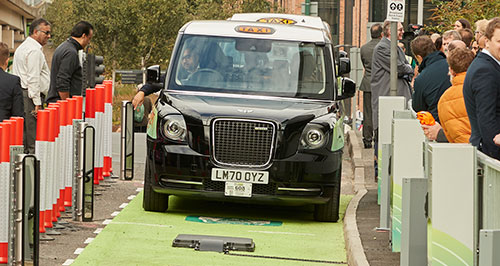Make / Model Search
News - General News - Electric VehiclesAussie link in wireless charging for EVsLumen Freedom launches Aussie-developed wireless electric taxi charger trial in UK24 Oct 2022 PLUG-IN hybrid vehicles (PHEVs) could become redundant and recharging battery electric vehicles (BEV) a lot simpler following the introduction in the UK last week of an Australian-developed wireless EV charging system with electricity delivered to a vehicle over the air (OTA).
Where current technology entails the inconvenience of driving to a plug-in station/outlet either at home or externally to recharge, now, the Lumen Freedom system has been developed to perform wireless charging simply by parking over an inductive pad placed on or embedded in the road.
No physical touching is needed, enabling taxi drivers in the trial to seamlessly charge their vehicle batteries while waiting for their next passenger without leaving the vehicle to plug in or delay departure by first ending the charging session and unplugging.
Lumen Freedom, a technology company based in the outer Melbourne suburb of Hallam, is engaged in the development of the new recharger while also diversifying into manufacturing key components.
For the past few years, Lumen Freedom has specialised in wireless electric vehicle charging (WEVC) systems, and last week announced the first live trial of its Wireless Charging of Electric Taxis (WiCET) project using its WEVC technology.
The implications are immense when extrapolated into the wider EV community as it removes one major objection to their ownership; the cable plugging in scenario.
WiCET is a project funded by the UK’s Office for Zero Emission Vehicles (OZEV) and delivered through Innovate UK, to assess the commercial and technical viability of deploying wireless charging for electric Hackney Carriages (also known as a black cab or London taxi), with the potential to enable further electrification of transport that reduces emissions and improves air quality.
Five wireless ground assembly systems have been installed at the main city centre taxi rank in the city of Nottingham in central England, where nine electrified taxis – five LEVC TX and four Nissan Dynamo – have been retrofitted with wireless vehicle assembly systems.
Lumen Freedom have been working closely with the WiCET Project Team since the beginning of 2021 on the development of WiCET’s technical requirements while providing evaluation and development of wireless charging hardware for the successful first phase of the project.
In a statement released last week, Lumen Freedom says: “Electrification of taxi fleets in congested city areas is a crucial step in the reduction of transport emissions and improving air quality.
“The time taken for taxi drivers to recharge can reduce the driver’s earning potential – cable charging is inconvenient and impractical at a taxi rank. Wireless charging provides drivers with the opportunity to recharge their vehicles while waiting for their next passengers.”
Lumen Freedom general manager Rod Wilson said the company was “delighted to have been nominated as the wireless charger hardware supplier for the WiCET project”.
He said Lumen Freedom is looking forward to “seeing wireless charging deployed across a wide range of applications from passenger cars to public transport and emergency vehicles”.
WiCET project manager and technical specialist at the Low Carbon and Fuel Cells Centre of Excellence (Cenex), Richard Sander, said the organisation was “extremely proud to be starting the first public trial of wireless charging of taxis in the UK”.
“This is a big step in understanding and demonstrating the potential of wireless charging as a core technology in the electric vehicle transition.”
Wireless electric vehicle charging is a simple solution for charging electric vehicles and hybrid electric vehicles, without the fuss of having to plug in.
Lumen Freedom says the efficiency levels of its WEVC systems are comparable to plug-in or other conductive charging systems that use electrical contacts instead of plugs.  |
Click to shareGeneral News articlesResearch General News Motor industry news |









Facebook Twitter Instagram